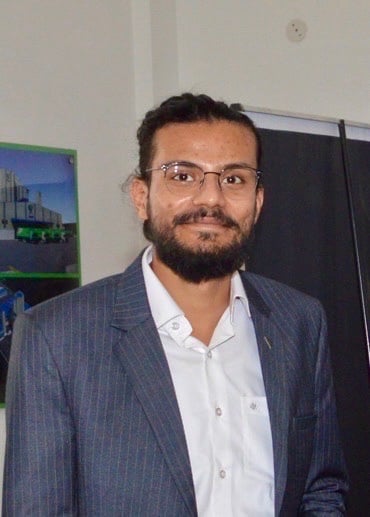Building a greener future: Mustafa's commitment to sustainability at De Heus India
Mustafa has been with De Heus India since 2017. Initially, he worked in various roles including plant maintenance, IT management, and production management, leveraging his background in electrical engineering. Over time, he took on the position of Corporate Social Responsibility (CSR) Officer, overseeing the company’s environmental and social initiatives. Next to that, he is closely involved in the Greenfield project in India.
Change is on the horizon with the upcoming Greenfield project, expected to be operational by the fourth quarter of 2025. This project provides the best opportunity to implement today's sustainable production methods from the start.

Sustainability and data collection efforts
Mustafa and his team carefully track logistics data, including fuel types, vehicle types, and kilometers driven. They also monitor compliance with the supplier code of conduct. Since the implementation in June, they have made the first steps towards 20% compliance by volume, aiming to increase towards the 100% mark as soon as we can. Integrating sustainability into daily operations is challenging, progress is being made in logistics, such as optimizing vehicle shipments to reduce the environmental footprint.
Environmental challenges and future projects
For the upcoming Greenfield project, Mustafa has proactively addressed several environmental concerns. The plant complies with Indian boiler regulations and pollution norms, and the team is in contact with vendors for responsible waste disposal and recycling. A significant challenge is managing the disposal and recycling of Polypropylene – or woven plastic bags used in feed supply. Mustafa's team is actively brainstorming solutions to recycle these bags, such as converting them into plastic granules.
Industry standards and sustainability initiatives
Sustainability is becoming increasingly crucial for De Heus India's operations and market reputation. Compared to international standards, many Indian companies have room to increase their sustainability efforts. With this in mind, Mustafa and his team are committed to adopting global best practices and contributing to environmental conservation. Large international companies in India, like Starbucks and McDonald's, set a great example with their sustainability initiatives. De Heus India aims to follow their example and realize the benefits of sustainable practices to benefit the animal feed sector and their farmers.

Impact of climate change on operations
High temperatures, which occur more and more frequently due to climate change significantly impact the factory's operations. Recently we experienced temperatures reaching up to 51 degrees Celsius, that pose serious challenges for the workers. To mitigate this, the company provides additional hydration options, working hours late in the evening and during the night. To preserve product quality we plan to install thermal insulation in the warehouses. Last year's floods also disrupted operations, highlighting the need for robust climate resilience strategies. Mustafa's team is actively seeking solutions to enhance our ability to cope with such extreme weather events in the future.
Sustainability in daily operations
In logistics, for example, the company optimizes vehicle use by consolidating shipments, reducing the environmental impact. Sustainable practices are also being implemented in the office environment. Several initiatives are already planned for the new Greenfield project to ensure more sustainable operations from the start.
Conclusion
Mustafa's journey at De Heus India demonstrates a strong commitment to sustainability despite numerous challenges. With a determined outlook on the future, he is optimistic about the factory's initiatives and their positive impact on the environment. De Heus India is dedicated to continuous improvement and sustainability, and Mustafa plays a crucial role in this endeavor.